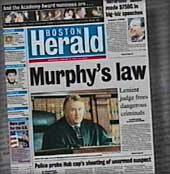David Frank of Massachusetts Lawyers Weekly reports that the Boston Herald has lost a libel suit brought by a woman who charged the paper had falsely claimed she engaged in “sexual acts” while visiting an inmate at Bridgewater State Prison in 2009. Lawyers Weekly has posted the jury’s verdict form as well.
The plaintiff, Joanna Marinova, was awarded about $563,000 in damages. According to Frank, Marinova’s lawyer, David Rich, “argued that the story was intended to sensationalize a trip that his client and Rep. Gloria Fox made to the prison to investigate alleged incidents of inmate abuse.”
Herald lawyer Peter Biagetti provided a statement to Lawyers Weekly that reads in part: “The article was meticulously researched, carefully written and extremely well-documented. We are proud of it, and of the journalist who wrote it.”
Rich was part of the legal team that represented former Superior Court judge Ernest Murphy, who won a $2.1 million libel verdict against the Herald in 2005.
Disclosure: In 2011 I moderated a panel organized by Marinova on the media and violence.
Click here for a post I wrote about the case in 2011, which included some tough words for the Herald from Superior Court Judge Raymond Brassard.
Click here for a 2009 analysis by Adam Reilly, then of The Boston Phoenix, now of WGBH-TV (Channel 2).
5:10 p.m. update: Stories have now been posted by the Herald, The Boston Globe, CommonWealth magazine and the Boston Business Journal.


